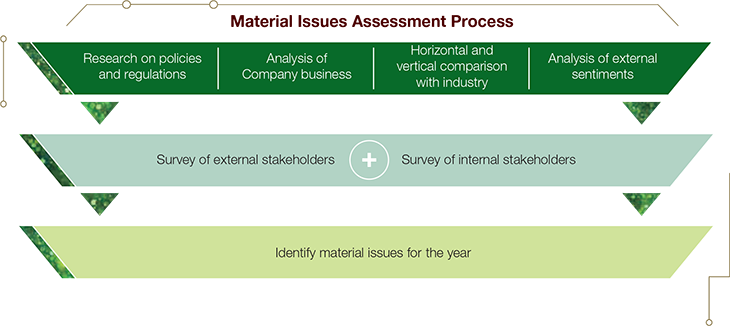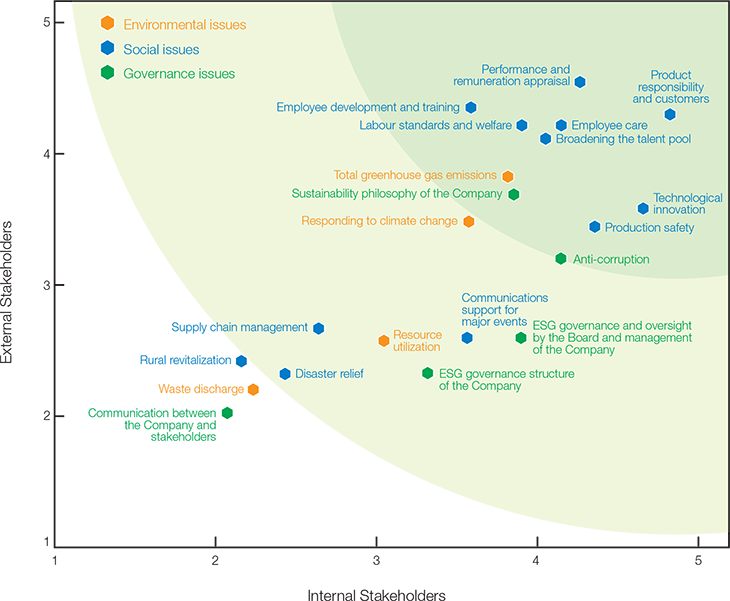This report is prepared pursuant to the Environmental, Social and Governance (“ESG”) Reporting Guide (the “Guide”) in Appendix C2 to the Rules Governing the Listing of Securities (the “Listing Rules”) on The Stock Exchange of Hong Kong Limited (the “Stock Exchange”). This report covered the period from 1 January 2024 to 31 December 2024. This report has complied with all the “comply or explain” provisions as set out in the Guide. We did not disclose certain key performance indicators which are required to be disclosed by the Stock Exchange but not directly related to the business of the Group or have minimal influence.
This report covered the data and cases from China Communications Services Corporation Limited and its subsidiaries. There is no significant change in the scope of this report from that of the 2023 ESG Report. For detailed information on the Company’s governance structure, organizational structure, market of its services, and organizational scale, please refer to the Company’s annual report for the year 2024.
Philosophy of Environmental, Social and Governance
As a leading service provider in the informatization sector in the PRC, the Group adheres to its position as a “New Generation Integrated Smart Service Provider” and commits to “Building Smart Society, Boosting Digital Economy, Serving a Good Life”, providing integrated comprehensive smart solutions in the informatization and digitalization sectors.
Sustainable Development
The Group places a strong emphasis on the concept of scientific development, actively responds to the United Nations Sustainable Development Goals (SDGs) initiative and adheres to the sustainable development principle of “customer prioritization, efficient resources allocation, talent orientation, as well as responsibility and commitment”. On the back of our fundamental missions of serving our customers, bringing returns to our shareholders, caring about our employees and giving back to society, we are committed to providing innovative, high-quality, efficient and secure integrated services including telecommunications infrastructure services, business process outsourcing services, applications, content and other services, while delivering value to our customers and the society, promoting healthy and sustainable development of itself, and aligning our corporate development with society and environment.

Board Statement
The Board of Directors (the “Board”) of China Communications Services Corporation Limited (the “Company”) is the highest responsible and decision-making body for ESG governance and has overall responsibility for environmental, social and governance work. The Board meets annually to review and approve the publication of this report (including the review of the progress on ESG-related goals). The Company’s management is authorized to be responsible for the implementation of specific ESG works of the Group (including stakeholders identification and communication). At the same time, the Board reviewed the potential risks and opportunities of ESG issues on the Company’s overall strategy and the results of the materiality assessment of ESG issues.
The Audit Committee of the Board holds meetings twice a year to assist the Board in considering specific ESG work and is responsible for assisting the oversight of ESG issues and is continuously enhancing the requirements of internal control processes for ESG risk identification. The management of the Company formulates relevant internal control processes in accordance with the requirements of the Audit Committee of the Board to ensure the effective control of ESG risks by the Company’s risk management and internal control system, and incorporates key ESG risks into the Company’s comprehensive risk management system.
During the year, the Board and the Audit Committee listened to the Company’s ESG work plan and relevant management initiatives, including energy consumption, green and low-carbon development, and other social responsibility issues such as disaster relief, production safety, staff training and anti-corruption. In addition, the Board and Audit Committee were also briefed on the Company’s work plan to address the new disclosure requirements on environmental, social and governance reporting under the Listing Rules of the Stock Exchange of Hong Kong and the “International Financial Reporting Sustainability Disclosure Standard No.1—General Requirements for Disclosure of Sustainability-related Financial Information” and “International Financial Reporting Sustainability Disclosure Standard No.2—Climate-related Disclosures” issued by the International Sustainability Standards Board (ISSB).
ESG Governance Structure

Communication with Stakeholders
The Group pays attention to the common interests of stakeholders, including the government and regulatory authorities, shareholders and investors, employees, suppliers, customers and communities. It attaches great importance to the communication with them. Through announcements, regular reports, meetings, talks, visits, special communications and events, the Group collates and actively responds to the views and suggestions of all parties to promote innovation, coordination, green, openness and sharing in corporate development.

Material Issues Identification and Assessment Process
In order to gain a more in-depth and objective understanding of the ESG issues that stakeholders are concerned about, during the preparation period of this report, the Group carried out a materiality assessment of these issues, summarized and categorized the material ESG issues of our company, and used this as the basis for the preparation of this report.
Identify ESG Issues
Based on the 2023 materiality assessment results, the Group conducted a comprehensive analysis of stakeholder concerns with reference to its overall business development in 2024, advanced ESG management practices within the industry, the 12 levels of ESG issues outlined in the Guide, its own business and industry characteristics, as well as the engagements with external stakeholders — such as shareholders, investors, and capital markets through investor meetings and active participation in ESG rating agency questionnaires. Meanwhile, aligning with its corporate strategy, the Group conducted internal interviews and surveys with employees on sustainability-related topics. With a combination of the above internal and external analysis, the Group determined 21 ESG issues for the year.

Formulate and Implement the Stakeholder Communication Plan
During the ESG issue assessment process, the Group attached great importance to the interaction and communication with various stakeholders. The Group formulated a detailed stakeholder communication plan and collected the concerns and expectations of various stakeholders (including investors, employees, customers, suppliers, the community, etc.) regarding ESG issues through various means (such as regular surveys, questionnaires, discussion sessions, etc.).
Quantitative Assessment of Material ESG Issues
The Group carried out an online questionnaire survey, inviting various stakeholders to rate the importance of the company’s ESG issues in 2024. The ratings were scored from 1 to 5, with the materiality increasing successively.
A total of 2,448 stakeholders participated in this survey, covering various types of stakeholders such as corporate directors, management, employees, investors, suppliers, industry associations, and the community.
The Group analyzed the results filled in by various stakeholders, evaluated the importance of each issue from two dimensions of “internal materiality” and “external materiality”, identified 11 extremely material issues, 7 material issues, and 3 relevant issues, and derived the Company’s ESG issue materiality analysis matrix for this year.
The results of this assessment of material issues have been reviewed and confirmed by the Board.





